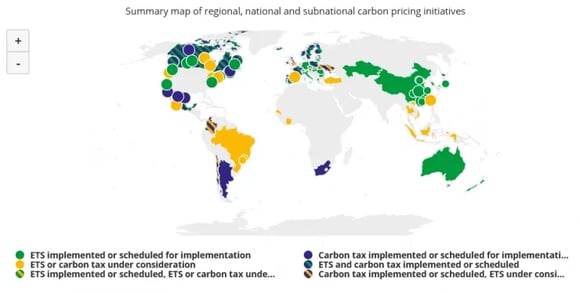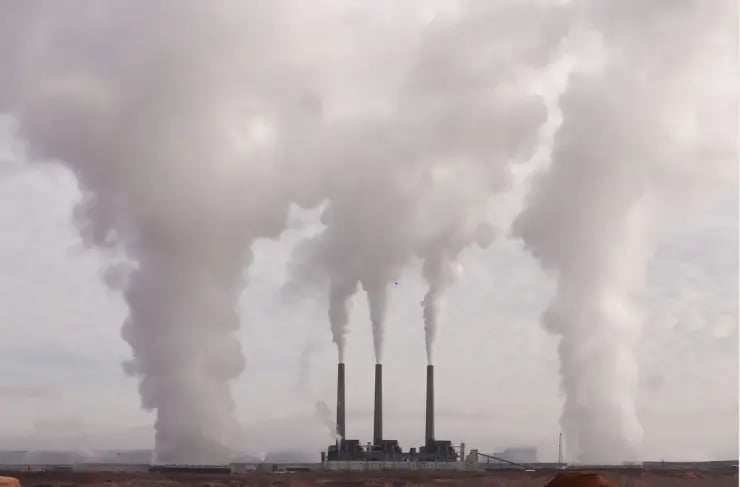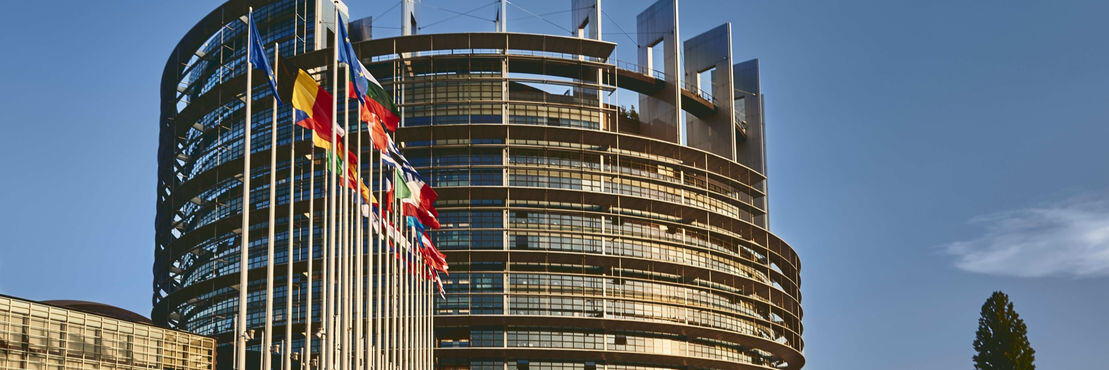Während man zunächst annehmen könnte, dass diese neue CO₂-Bepreisung nur die eigenen Scope-1-Emissionen (also jene Emissionen, die ein Unternehmen direkt freisetz) betrifft, werden die zusätzlichen Kosten entlang der Wertschöpfungsketten so aufgerollt, dass auch Scope-2- und -3-Emissionen bepreist werden. Dies bedeutet, dass für Unternehmen oder auch Konsument auch indirekte CO₂-Emissionen aus den Wertschöpfungs- und Lieferketten in Zukunft höhere Kosten verursachen werden.
Hintergrund der CO2-Bepreisung
In Deutschland ist die CO₂-Bepreisung seit 2005 Teil des EU-Emissionshandelssystems (EU-ETS). Als zentrales Klimaschutzinstrument der Europäischen Union wurden bisher bereits die Emissionen aus der Stromerzeugung, energieintensiven Industrien und dem Flugverkehr mit einer zusätzlichen Abgabe belegt. Um den Anwendungsbereich aber auch auf die Sektoren Verkehr und Wärmetechnik auszuweiten, hat die Bundesregierung nun eine Novelle des Kraftstoff-Emissionshandelsgesetzes vorgenommen. Das Geld, das nun durch die zusätzliche Bepreisung von Kohlenstoffdioxid generiert wird, soll vom deutschen Staat dazu verwendet werden, den Ausbau der Energiewende finanziell zu unterstützen.
Die neue Bepreisung findet ihren Ursprung im Klimaschutzprogramm 2030, das 2019 von der Bundesregierung beschlossen wurde. Es soll einen ökonomischen Anreiz für Energiesparmaßnahmen sowie für den verstärkten Einsatz von erneuerbaren Energien schaffen. Weltweit haben bereits 26 Länder eine zusätzliche Bepreisung von Kohlenstoffemissionen eingeführt. Einem Bericht der Weltbank “State and Trends of Carbon Pricing 2019” zufolge sind damit rund 11 Milliarden Tonnen CO₂-Äquivalent, was etwa 20 % der globalen Treibhausgasemissionen entspricht, zusätzlich bepreist.

(Die Weltbank 2021)
Was bedeutet der neue CO2-Preis für mein Unternehmen?
Die Mehrkosten für den Ausstoß von CO₂ werden in Zukunft auf die gesamte Liefer- und Produktionskette umgelegt. Somit müssen sowohl Endverbraucher als auch Unternehmen in den kommenden Jahren mit Preisaufschlägen für fossile Brennstoffe rechnen. So wird beispielsweise der Preis für einen Liter Diesel oder Heizöl zunächst um 6,7 Cent und schließlich um 14,7 Cent im Jahr 2025 steigen. Auch die Nutzung von Erdgas wird teurer – während zunächst ein Preisaufschlag von 0,5 Cent pro Kilowattstunde zu erwarten ist, wird dieser bis 2025 auf 1,1 Cent steigen. Wenn Sie ein Unternehmen führen, dessen Unternehmensleistung von einem hohen Energieverbrauch abhängt, müssen Sie mit hohen Mehrkosten durch die neue CO₂-Bepreisung rechnen. Wenn Sie beispielsweise 5 Gigawattstunden pro Jahr verbrauchen, müssen Sie mit Mehrausgaben von bis zu 30.000 Euro im Jahr 2021 und bis zu 65.000 Euro im Jahr 2025 einkalkulieren.
Wie kann ich meine (in-)direkten Kohlenstoffemissionen bewerten und Energiesparmaßnahmen in meinem Unternehmen einführen?
Mit unserer LCA Software Umberto können wir Ihnen eine genaue Bilanz Ihres Energieverbrauchs erstellen und Ihnen so entsprechende Verbesserungs- und Einsparpotenziale aufzeigen. Das Wissen um die Existenz von Emissionen (auch bekannt unter dem Prinzip der Kohlenstofftransparenz) innerhalb von Wertschöpfungs- und Produktionsketten ist hier der Schlüssel.
Mit Hilfe von Umberto können Sie nicht nur Ihre direkten Emissionen innerhalb von Scope 1 mit genauen Kosten verbinden, sondern auch Optimierungspotenziale für den gesamten Corporate Carbon Footprint (Scope 1-3) identifizieren.
Kontaktieren Sie gerne unser Team für Nachhaltigkeitsberatung und vereinbaren Sie einen individuellen Beratungstermin.






